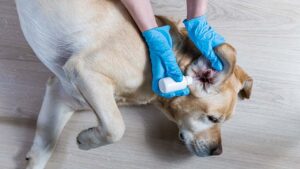Why does my dog’s ear make a crackling noise? If you’re asking this question about your dog’s ears, here’s what you should know. An ear that crackles indicates pus or another fluid may be present inside.
A bath is the most common cause since water gets inside the ear canals and becomes stuck. To get the sound and fluids inside to leave, your puppy will shake his head and scratch his ears. Most ear infections are characterized by swelling, redness, and discharge.
Make an appointment with the vet before the problem worsens. Additionally, this noise can sometimes occur without any connection to infection or complication with your dog’s ears. There may be a brief period when it disappears without causing any harm.
Before you scroll further down this guide, “Why Does My Dog’s Ear Make a Crackling Noise,” you can check out these other dog ear-related guides from our team at We Love Doodles: Is Dog Ear Piercing Safe and Legal?
What Causes Infections in a Dog’s Ear?
Many things can cause a dog’s ear infection. Understanding the cause can help you decide how to treat it and make it possible to prevent future ear infections.
- Yeast Infection in Dogs: A yeast infection is the most common cause of canine fungal ear infections. There is more than likely an underlying condition contributing to your dog’s frequent fungal ear infections. It is essential to resolve this question to achieve a long-term cure. An allergy, such as an allergy to food or something in the environment, can cause chronic ear infections in your dog. If you suspect your symptoms are due to food or environmental allergies, speak with your veterinarian immediately.
- Bacterial Infections: Yeast and fungal infections are not the only sources of bacterial ear infections in dogs; pathogenic and non-pathogenic bacteria can be picked up externally. Do you have a dog with long, heavy ears, or does he spend as much time as he can in the water? Cocker Spaniels, Basset Hounds, Beagles, and Dachshunds, all of which have long, heavy ears, are more likely to suffer from ear infections. Due to the lack of airflow and moisture trapped inside the ear canal, these breeds are prone to ear infections. A dog that frequently swims, such as a Labrador, often succumbs to this disease. Infections and possibly inflammation of the inner ear can occur regardless of the breed when harmful bacteria become trapped. Your veterinarian should be consulted promptly if you notice symptoms so that the type of infection can be identified and treated. Your dog’s ears should be thoroughly dried after bathing or swimming because excess moisture can cause bacterial infections. It may be necessary for your veterinarian to conduct a follow-up examination if the infection does not clear up in a few days.
- Dog Dealing with Allergies: The most common cause of dog ear infections and ear problems is allergies. A food allergy or an airborne allergy is the most common. Pain, redness, and discharge are the same symptoms as any other ear infection. A dog with an ear infection caused by allergies frequently scratches his ears and shakes his head. Before diagnosis, it is practically impossible to prevent ear problems in dogs caused by allergies. You can protect your puppy from ear infections by avoiding the allergen that caused the infection.
- Dog Has Too Much Hair: Some breeds have large amounts of hair in their ear canals, such as Poodles, Lhasa Apsos, and Shih Tzus, which can lead to ear problems for dogs. This is a minor issue, but blocking the airflow and trapping moisture inside the ear canal can sometimes result in ear infections. Whether you take your dog to a groomer or use clippers, you want to ensure it’s clean. The ear hairs of your dog should not be plucked because that can create minor wounds which may become infected. Maintain a dry environment by trimming the ears carefully.
- Hematoma: A dog ear infection causes an ear hematoma, unlike the other typical dog ear problems and conditions listed above. Hence, you might experience this symptom if you have one of the above ear-related issues. The blood vessels under the skin bleed when stressed, resulting in hematomas in dogs and fluid-filled pockets formed when the blood vessels under the skin bleed. You can identify dog ear hematomas when your dog’s ear flap swells, especially at its tip.
- Dog Ear Mites: The problem of ear mites in your dog may very well be causing her to scratch her ears or shake her head quite often. A veterinarian can determine the symptoms of ear mites or whether an actual infection may cause them. Antiparasitic formulations that work fast should be prescribed if ear mites are the culprit. The problem with mites is that they burrow into your dog’s ear tissue, which means they feed on the ear wax and other tissues in his ears. Eventually, these open sores become infected as a result of this burrowing.
How to Prevent Ear Infections and Crackling Noises in a Dog’s Ear
If your dog suffers from ear infections regularly, there are some things you can do to help prevent them from reoccurring.
- Cleaning Your Dog’s Ears Regularly: Maintaining your dog’s ears regularly is the best way to prevent crackling sounds. Additionally, ensure they are clean, smelly, and not inflamed to avoid infection. It is recommended that you wash their ears at least twice a week. You can leave your dog’s ears clean by mixing a small amount of alcohol and white vinegar in a bottle and using a cotton ball to apply it. Also, you can use wipes that are specially designed for dogs and cleaning solutions for dogs.
- Parasite Protection: The presence of ear mites in the ears of healthy adult dogs living inside can result in ear infections, but these infections are relatively uncommon. Your dog will often be protected from these parasites with the same medications he uses against fleas and ticks. Your veterinarian can help treat and prevent ear mites if your dog has them.
- Grooming Your Dog: Keeping your dog’s head hair trimmed will reduce the likelihood of infection. Trimming your dog’s head hair regularly can reduce the chances of infection. Please make sure you also prevent hair from getting inside their ears. Dogs have different breeds; some are hairy, so keep that in mind when choosing your puppy.
- Giving Your Dog the Proper Diet: It is common for dogs to experience skin and ear symptoms related to food allergies. Dogs scratch and shake their heads excessively when their canals become red, itchy, and inflamed. An overgrowth of yeast or bacteria occurs due to this disruption of the normal defenses against infection. A dog’s allergies can be pinpointed through allergy testing, and those with special dietary requirements can choose from several options. Ensure that you consult your veterinarian before altering your dog’s diet. In addition, they can also assist you in choosing the right dog food for your puppy, including raw feeding options, home-cooked diets, grain-free options, and limited-ingredient dog foods.
- Dry Your Dog’s Ears Thoroughly: When a water-loving dog dries off his ears thoroughly after swimming, it is fine to let him swim occasionally. Taking a bath is no different. Water-soaked pinnas and ear canal openings are often gently dried with cotton balls or gauze squares, but there might be a better way.
How to Treat Dog Ear Infections Properly
Dog infections are treated in different ways.
These treatments for your dog’s ears are the most common:
1. Antibiotics
Most veterinarians will order antibiotics for ear infections. The antibiotic will help fight the infection so your dog can recover. The antibiotics are usually offered in pill form and may need to be given to the dog daily for up to two weeks.
2. Total Ear Canal Ablation
Most uncomplicated ear infections disappear within 1 to 2 weeks when appropriate treatment is initiated. The problem may persist for months if the infection is severe or become chronic if the condition is underlying. Your veterinarian may recommend Total Ear Canal Ablation (TECA) in cases of severe chronic disease when other treatments have failed.
By removing the ear canal, TECA surgical procedures remove diseased tissue and prevent infection from recurring. If your veterinarian recommends a recheck appointment, follow their instructions closely.
Recurrence of the infection can result from lapses in treatment. If your dog appears to be getting better, it’s still important to finish the full course of medication. Additional problems, such as resistant infections, may result from not finishing the whole course of treatment.
3. Herbal and Home Remedies
Home remedies can also reduce symptoms, even though they are less effective than antibiotics. A visit to the vet is always recommended before using this method. Apply a pure cotton ball with green tea and apple cider vinegar to the puppy’s ears. Do not press the cotton ball into the ear, as you could damage the eardrum.
Related: Zymox Ear Solution For Dogs.
Conclusion For “Why Does My Dog’s Ear Make a Crackling Noise”
Why does my dog’s ear make a crackling noise? Well – now you know. If your dog has crackling ears, it could have an infection or another ear disorder. While there are things you can do to treat the ears at home, it’s also a good idea to take your dog to a veterinarian so the ear issue can be diagnosed and proper treatment can be found.
If you find this guide, “Why Does My Dog’s Ear Make a Crackling Noise,” informative and helpful, you should check out:
- Why Does My Dog Sleep by the Door?
- Why is My Dog Eating Grass Frantically?
- Why Does My Dog Scratch The Carpet?
You can learn more about your dog’s ears by watching “How to Clean a Dog’s Ears” down below:

Dr. Sabrina Kong graduated from the Royal Veterinary College in England in 2016 and has been working at a small animal clinic in Northern California since then. She grew up in the Bay Area and got her bachelor’s degree from Cal Poly San Luis Obispo. She also became a Certified Canine Rehabilitation Practitioner through a program at the University of Tennessee.
When she isn’t in the clinic taking care of her four-legged patients, she enjoys traveling and trying new foods with her friends and her three-legged dog, Apollo. She adopted Apollo from her clinic when he was a puppy with numerous health issues. Dr. Kong truly cares about taking care of animals.




